|
|
|
Sort Order |
|
|
|
Items / Page
|
|
|
|
|
|
|
| Srl | Item |
| 1 |
ID:
138297
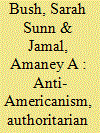

|
|
|
|
|
| Summary/Abstract |
A pillar of American foreign policy in the Middle East since September 11, 2001, has been promoting democracy, with particular emphasis on support for women's representation. Given high levels of anti-Americanism in the region, does foreign pressure for policy reform undermine this project? Evidence from a nationally representative survey experiment in Jordan shows that an American endorsement of women in politics has no average effect on popular support for women's representation. Instead, domestic patterns of support and opposition to autocrats determine citizens' receptivity to policy endorsements, with policy endorsements of foreign-supported reforms polarizing public opinion. Both foreign and domestic endorsements of women in politics depress support among Jordanians who oppose their regime significantly more than among Jordanians who support it.
|
|
|
|
|
|
|
|
|
|
|
|
|
|
|
|
| 2 |
ID:
129029
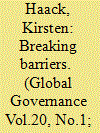

|
|
|
|
|
| Publication |
2014.
|
| Summary/Abstract |
The appointment of Christine Lagarde in 2011 to the leadership of the International Monetary Fund may have been a highlight for women's representation in international organizations, suggesting that the final glass ceiling for women in global governance has been broken. However, this article shows that leadership and representation by women in global governance continues to be curtailed by "glass walls" on the one hand, and flexible glass ceilings on the other. While women in UN agencies today stand on firmer floors, relying on a stronger institutional framework and increasing numbers of women working at all levels of the UN system, women are channeled into gender-specific portfolios, creating glass walls. Moreover, glass ceilings, once shattered, may indeed resettle as recent staff changes by Ban Ki-moon show. Thus, the picture of women's representation and gender equality in UN leadership is a mixed one.
|
|
|
|
|
|
|
|
|
|
|
|
|
|
|
|
| 3 |
ID:
092365
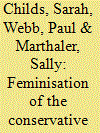

|
|
|
|
|
| Publication |
2009.
|
| Summary/Abstract |
Under David Cameron's leadership reforms have been made to the Conservative party's parliamentary selection procedures and distinct women's policy initiatives have been developed. This article, based on focus group data with party members, explores attitudes towards measures designed to recruit more women Conservative MPs. Broadly, we find that, despite widespread support for the principle of greater social diversity among PPCs, members are uncomfortable with the specific measures that have been introduced. This is largely on the grounds that anything approaching 'positive discrimination' should be eschewed in favour of the 'meritocratic' selection of candidates. Further, the members tend to resent central party 'interference' in what has traditionally been the domain of local Constituency Associations.
|
|
|
|
|
|
|
|
|
|
|
|
|
|
|
|
| 4 |
ID:
184719
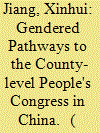

|
|
|
|
|
| Summary/Abstract |
Women are underrepresented in legislature almost worldwide, and China is no exception. Although the Chinese Communist Party (CCP) implemented its first gender quota in 1933, gender quotas and women's representation in China remain understudied. This study fills the literature gap by examining the subnational variation in gender quota implementation and women's representation in the county-level people's congresses (CPC). Through a comparison of four county-level units in Hunan and Hubei with similar socioeconomic features yet contrasting results in the numbers of female representatives elected in the 2016 CPC election, this study argues that women's access to CPCs is affected by the CCP's adoption and enforcement of grassroots quotas. The fieldwork shows that although all cases introduced a 30 per cent gender quota, only CPCs in Hunan province were able to meet the quota requirements. This was because the grassroots quota threshold was raised in Hunan and strictly enforced, partly as a response to the 2013 Hengyang vote-buying scandal. In contrast, CPCs in Hubei province nominated a large number of “first hands” (yibashou) candidates, very few of whom were women.
|
|
|
|
|
|
|
|
|
|
|
|
|
|
|
|
| 5 |
ID:
118228
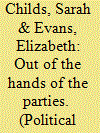

|
|
|
|
|
| Publication |
2012.
|
| Summary/Abstract |
At the next general election the percentage of women elected to the smaller House of Commons risks being lower than in the current parliament, where they constitute 22 percent of all MPs. The 2008-10 Speaker's Conference identified many of the barriers faced by women and other under-represented groups and made a series of recommendations, only some of which have been introduced. The Government favours a voluntary approach to Recommendation 24, which calls for diversity data monitoring, whilst Recommendation 25 which calls for serious consideration of legislative quotas in the absence of a significant increase in the numbers of women in 2010, appears forgotten. A second Speaker's Conference should therefore be established; the issue of women's under-representation should be taken up above the party level-with legislative quotas introduced to address the system level failure of democratic representation at Westminster.
|
|
|
|
|
|
|
|
|
|
|
|
|
|
|
|
|
|
|
|
|